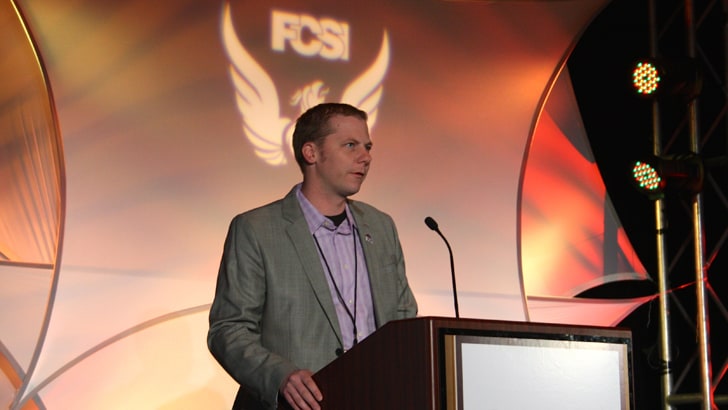
The “phoenix is rising” theme of this year’s national FCSI The Americas Conference reflected the Phoenix, Arizona location of the annual event but also neatly encapsulated the positivity and resurgent nature of the foodservice industry in the US. For the professional consultant members of FCSI and their allied member manufacturer colleagues, the conference was an overwhelmingly upbeat and confident affair.
Held between 10-12 April at the Pointe Hilton Tapatio Cliffs Phoenix Resort, situated among the beautiful North Phoenix Mountain Preserves just north of the city centre, the conference boasted an impressive speaker programme as well as a series of diverse expert breakout sessions. The event, chaired by Eric Norman FCSI, also featured the biennial Innovation Showcase, featuring the top ten finalists for the FCSI Product of the Year. The Showcase award was won by Alto-Shaam for their new CT PROformance Combitherm series oven.
Professional consultant and past chair of The Americas Division Jim Petersen Jr FCSI was recognised with the 2014 Robert Pacifico “Doing Well by Doing Good” award for the dedication and the “outstanding, selfless service” he has shown to the Society through the years. Former president of FCSI Worldwide Ed Norman FCSI was awarded with a special ceremonial gavel for the service he too has given to the FCSI throughout his career. Norman formerly handed the Worldwide president gavel over to Jonathan Doughty FCSI, who will now serve a two-year term leading the Worldwide board.
Montpelier, Virginia-based professional member Douglas Huber FCSI was also presented with the 2014 FCSI The Americas Service Award by FCSI The Americas executive director Wade Koehler. The award recognised the leadership Huber has shown FCSI and for consistently “bringing his A-game without needing to be in the limelight.”
The opening keynote speaker at the conference was Stacy Nelson of consultancy firm VitalSmarts who addressed how attendees could become better communicators through mastering the art of having “fierce conversations” and weighing up whether it pays to be “nice or honest”. Nelson, who has over 35 years’ of experience, helps individuals and organisations “break down the barriers that prevent effective communication increasing organisational effectiveness”.
“We have a tough time being honest with each other,” said Nelson, “but feedback is the breakfast of champions.” Olympians, said Nelson “don’t just want positive feedback, they want honest feedback.”
According to Nelson, “leadership is influence, period,” while power, in itself is ineffective, “because it just creates resistance.” Good communicators create conditions of dialogue and “debate is not detrimental” to success.
He encouraged FCSI members to speak up “because they care” about maintaining a strong service culture in their industry and to learn from failure, because it “provides a constant process of feedback”. Nobody, said Nelson, “is as smart as all of us – the crowd is always smarter than the smartest person in the room”.
Martin Cowley, senior manager design and standards for Walt Disney Parks and Resorts, gave a fascinating insight into a vast global operation that boasts 41 hotels, 11 theme parks, four cruise ships, two water parks and 14 country club resorts. Last year saw 120 million meals served across Disneyland in Anaheim, California, and Walt Disney World, Florida, alone.
For Cowley, the common threads that run through all of the operations he is responsible for are efficiency (labour and speed of service), maintenance and serviceability, environmental performance and meeting project budgets and schedules. Cowley’s team consistently has to “design for flexibility” as menus change so frequently. For Disney’s Shanghai theme park Cowley had to “design for five years ahead”, such were the demands of the project’s scale.
The Disney empire opens a new theme park every three years and is firmly committed to growth. Cowley’s team, responsible for foodservice in snack carts and food kiosks through to five star dining ‘unique experiences’, simply “couldn’t do it without FCSI”. Cowley cited Tom Rica FFCSI of Ricca Newmark as being a particularly important consultant to the operation. “US consultants are the MVP [most valued player] of these projects,” said Cowley. “They are the core of getting these projects to work. They are the most talented and knowledgeable people on the projects… it’s an art form watching you guys work,” he told conference attendees.
Expert breakout sessions at the conference covered a wide range of topics from green solutions in the kitchen to restaurant design, trends in adult beverages and menu design in 2015, while a panel debate on the future of FCSI featuring John Turenne FCSI, James Camacho FCSI, FCSI associate Brett Daniel and FCSI senior associate AJ Barker, generated plenty of food for thought on a Society fit for 2020.
A particularly engaging session titled ‘My loss, your gain’ featured experienced professional members Karen Malody FCSI, Bill Caruso FFCSI, Albert Da Costa FFCSI and Harry Schildkraut FCSI, giving a light-hearted look at some of the key mistakes they have made, and crucially learnt from, over the years. John McDonough, President & CEO, Heritage Food Service Group, Inc. also led a productive session on understanding warranties which prompted strong engagement from the conference floor.
The closing keynote speech was a high-octane presentation from foodservice training and development veteran Jim Knight, formerly the head of training and development functions for 38,000 employees at Hard Rock International. Knight spoke on how to ‘amp up’ and revolutionise a company’s culture. The most successful companies in the world, said Knight, have a “shared mindset amongst all employees”. Employees, he said, have to be “unapologetically authentic in their guest obsession.”
Management must, said Knight, “create and embody a guest-obsessed purpose to the business”, and a strong company culture must place product, atmosphere, service and value as thes most important tenants of the business. “You can’t train somebody to smile,” said Knight. “All the best training in the world can’t change that.”
Michael Jones
Picture: W H Bender
